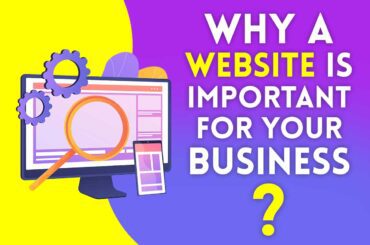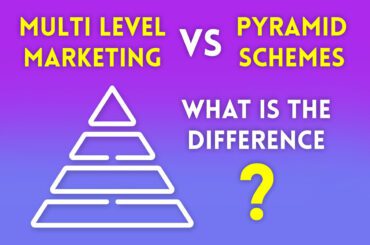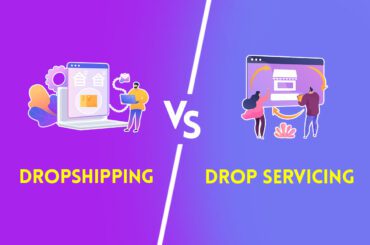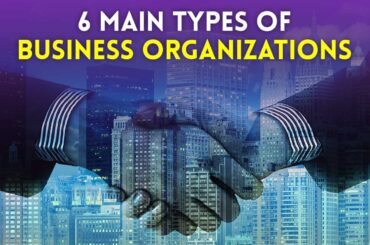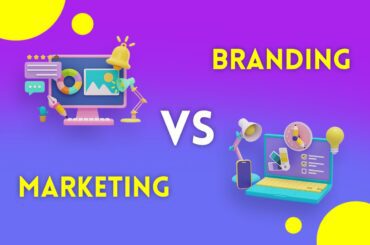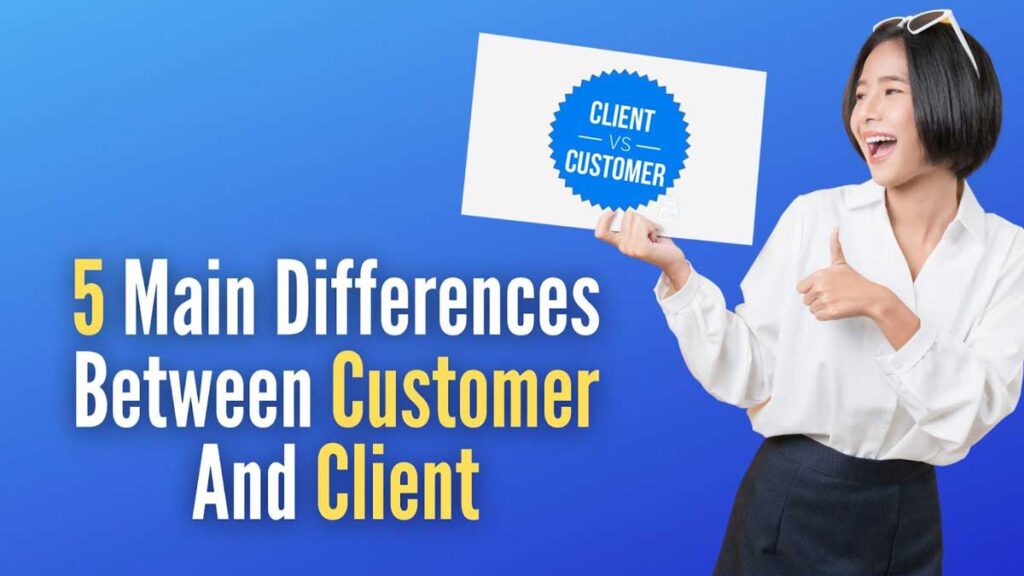
A lot of times, the terms “client” and “customer” are used synonymously. You are not alone if you use these two words in the same sentence. Many in the business world, especially in the SaaS sector, are confused by the difference between customer and client. Client vs customer has many differences.
After reading this article, you might wish to adjust your business plan to account for these differences, but we guarantee you’ll at least learn a lot about the definitions and why they’re important. Before we examine the customer and client difference and why it matters, let’s define each term first. The subtopics we will be looking at today are listed below.
- What is a customer & Characteristics of Customers
- what is a client & Characteristics of Clients
- 5 Main difference between customer and client
- client vs customer Services
So let’s start with a question. “What is a customer”.
What Is A Customer
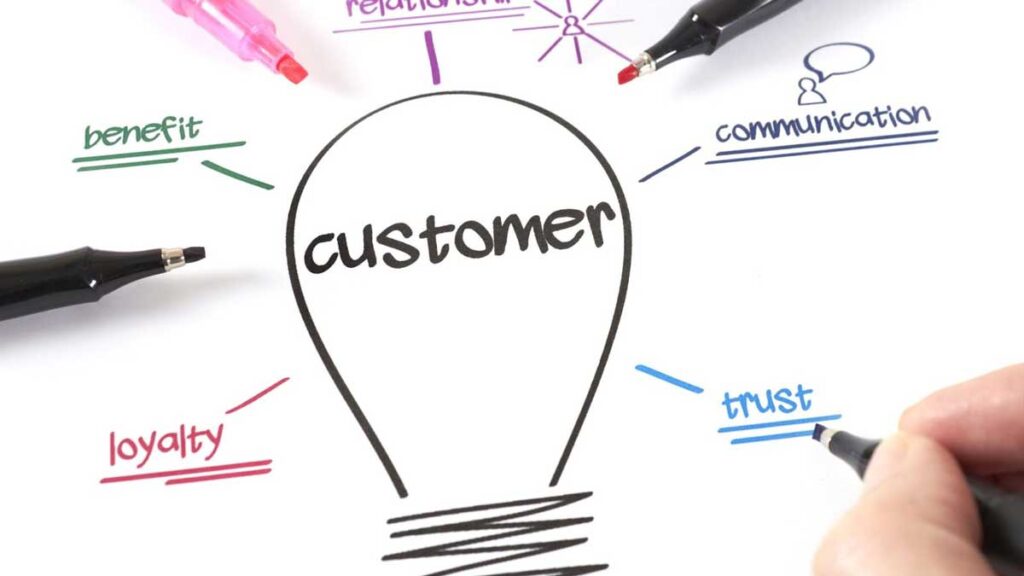
A person or company purchasing from a specific business, retailer, or institution is said to be a customer. With the help of this definition of the term “customer,” we can see that it typically refers to recurring transactions.
This makes sense because the word itself is derived from the Latin word “custom,” which, in its most basic definition, means “practice.”
Thus, we get that a potential customer is a person who often purchases items or has made it a habit to do so.
But given that you run a SaaS company, a “customer” in that context would be anyone who subscribes to your service.
At this stage, choosing the specific service, they wish to pay for immediately is what distinguishes a customer from a non-customer. They demand an immediate exchange of value for the cost they pay in return. This demonstrates that while all SaaS clients are customers, not all are customers.
Hold on. It will be discussed in more depth, so don’t worry.
Characteristics Of Customers
They Could Appear And Disappear Rather Fast.
Customers spend money on the exact SaaS solution they require to benefit from it immediately. This indicates that after a free trial period or perhaps a few paid packets, people will likely receive what they desire and depart.
In other words, your product may no longer be valuable to them or spark their interest because their demands may be transient.
They Are Here For Convenience.
Customers frequently purchase anywhere that is more convenient and at a better price rather than relying on the benefits that one particular company, store, or organization offers. Since their demands and wants may differ greatly, it is a little more difficult for you to satisfy your customers.
They Are Quite Clear About What They Require Of You.
Businesses that provide a single service and deliver physical things or products rather than ongoing services are typically the ones that have customers.
For instance, food chains have customers. Since people do not have a long-term client relationship with these establishments, they are quite likely to choose a different store that is closer to their place of residence or has lower costs.
These people select the goods or services they need and pay right away; granted, they might return to the same store later, but trust me when I say it’s always for an instantaneous exchange in exchange for their money.
What Is A Client
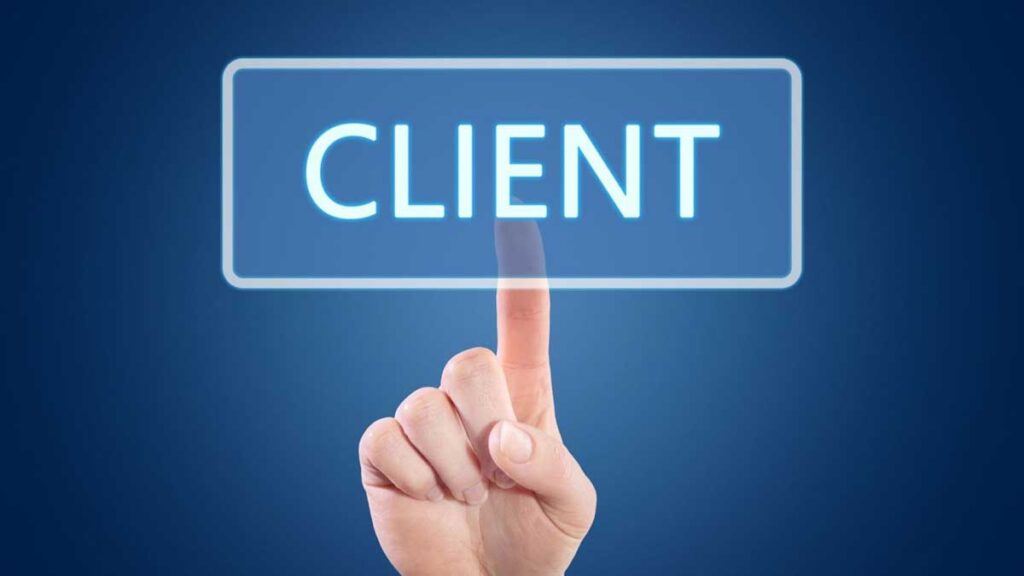
Clients are essentially those who use a company’s or organization’s services.
A client is a customer, however, one who is more loyal. They are customers with whom you develop a business relationship. Clients will continue using your company’s products and services for as long as possible.
A client is, therefore, quite likely to make a long-term investment in your product. To continue to benefit from your offering, they want to establish a personalized and trustworthy relationship with you and your business.
They are more concerned with being a part of the big picture than with the immediate exchange of cash for goods and services. They are also more interested in how the specific product might assist them in continuously and gradually achieving success.
Your client connection may come across as more of a partnership, be more successful in many ways, and boost overall client happiness and business performance.
Characteristics Of Clients
They Have Reasonable Expectations.
The majority of clients are known to have reasonable expectations for the quality of your work, and this is a crucial aspect that makes working with them very simple because they are responsible individuals who have done their research before meeting you.
Once you and your client are on the same page on the crucial elements, such as the budget and overall project aim, working for these profiles will be so much simpler.
They Have Great Faith In Your Expertise.
A good client takes the initiative to advance the project and doesn’t hold back when communicating their needs, desires, and ideas in a way that is helpful and clear.
This mentality of theirs permits you to meet deadlines and provide an outcome that they will actually love. They enjoy becoming involved, but they still leave you in charge so they can see how you manage things. Watch out right there.
They Welcome Advice.
You won’t need to go against the trend and defend each and every choice you make when your clients respect and trust you for your expertise.
Even though your client may come to you with a preconceived idea of what they want, having them accept your recommendations can make dealing with them much simpler.
Why Does Client Vs Customer Matter?
The client and customer relationship are somewhat similar. The difference between clients and customers in the SaaS sector is crucial to your company’s business plan. Customers will typically require more time and attention because they will be paying for your goods for a much longer period of time. Thus there will be more resources devoted to their success.
It makes sense to work on maximizing customer retention of your clients as they will be your most devoted patrons. Customer retention often costs five times less than customer acquisition, highlighting how crucial it is to provide your clients with highly personalized, excellent service and support.
We have covered the basics. Now let’s get into the main content of the difference between customer and client.
5 Main Differences Between Customer And Client
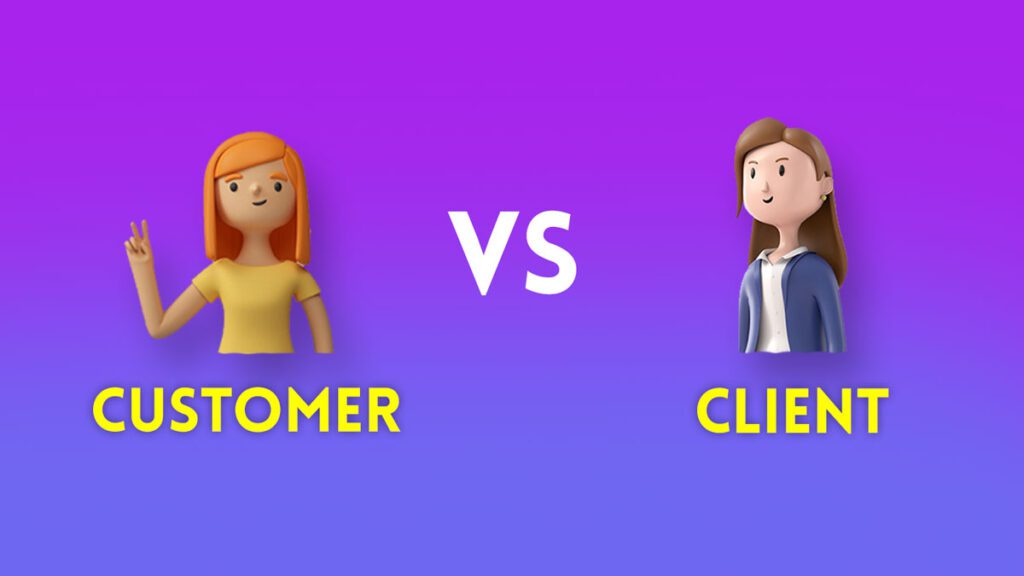
1. Differences In Names Alone
The use of these phrases may be expanded to new applications as heightened competition has raised businesses’ need to differentiate themselves from one another.
For instance, several technology businesses now refer to customers as “clients” rather than “users” since it implies a more significant connection between the company and the person utilizing its services.
The difference between a customer and a client may also be seen in the word origins. For instance, the word “customer” is related to the word “customs” as a manner of doing things and has its roots in Middle English from the 1400s.
On the other hand, the word “client,” which has a long history, was also a component of the Middle English language’s vocabulary. This difference in the nature of the relationship is emphasized by the word’s Latin derivation, clients, which means “dependent” or “follower.”
2. Companies That Make A Difference
For certain businesses, knowing the difference between these two patrons categories is essential. The distinction between a client and a customer can be crucial in the real estate industry, for instance.
The term “customer” refers to a person who hires a real estate agent to assist with the purchase or selling of a home but who does not really authorize the agent to act on their behalf. In contrast, a client gives a real estate agent permission to act on their behalf and anticipates that the agent would use any information at his or her access to his or her advantage.
The term “client” is sometimes used to refer to someone who engages a lawyer to draft a legal document but does not want representation. Healthcare professionals do have “patients,” but it is expected that they act on behalf of those patients and communicate all relevant data to them, much like businesses do with their clients.
3. Difference In Relationship
The term “client” could signify a dependable, ongoing business connection. For instance, a customer might enter a store once, select a few goods, and buy them before leaving.
On the other side, a client may come back regularly to make more purchases and may develop a long-term connection with a professional.
Expert advice can be requested by a client as well. While most businesses have customer service departments, many also have client “care” or “service” divisions that assist customers in understanding their options and making decisions.
While a customer may only be looking to buy goods and services, those whose relationships with businesses are important to them, like a client of a lawyer, require information that safeguards their interests.
4. Loyalty
Customers could be new or recurring customers, but they typically have little commitment to the business offering the goods or services.
Customers are often regarded as being customers by businesses, including retail stores, restaurants, service stations, supermarkets, banks, and amusement parks. The fixed-form, priced to sell goods and services, satisfy the wants of the Patrons.
Patrons are sometimes mistaken for clients in industries that need extensive personalization and modification of goods and services.
Over time, clients and professionals become more intimately connected. Businesses, including law offices, graphic design studios, talent agencies, accounting firms, medical facilities, and matchmaking services, provide clients with ongoing guidance and specific solutions.
5. Personal Attention
Last but not least, there is the issue of individual attention, which is very different in a client vs customer disagreement.
This is due to the fact that you always need to give someone else more one-on-one time if you want to establish a long-lasting relationship.
Consider it as you would a date.
You’d go on a date with a man or woman and hope that they’d think you’re attractive.
You weren’t looking for a one-night stand; you wanted to start a relationship. Therefore, you made every effort to get their attention and demonstrate your advantages.
Contrarily, if you wanted to score quickly, all you had to do was make up who you were and demonstrate how “great” you were.
Sure, you might get what you desire, but there’s no guarantee you’ll see that person again.
And that’s how the business operates.
While companies that already have customers cannot, or at the very least, should not mislead about their offer, their need for personalized service is less acute. Here, a product’s quality should perform as intended.
Client-based businesses have a very different take on the same issue. Given that you want to keep the client for as long as you can, personal attention is crucial here and should be given top priority.
Additionally, you hope that he will return and conduct ongoing business with you, such as with website development companies.
Client Vs Customer Services
Client services and customer service differ in the same ways that professional services and your customer support business do.
While a large number of customers will contact your customer support by phone, email, and chat, your professional services staff will be in charge of a smaller number of customers in order to provide them with more individualized service.
You might be wondering why this matters now that you are familiar with the differences between all of these terms and the various services.
Although not all businesses have clients, all businesses have customers. By virtue of having a dedicated customer success manager or case manager, clients will, by definition, receive more individualized attention and have greater access to staff.
It’s crucial to keep these differences in mind as you build your customer service plan. If you have customers, you’ll offer customer service.
However, if you have clients, you will provide a specific CSM to assist in the success of your most valuable clients. You might, in many situations, provide both client services and customer service.



